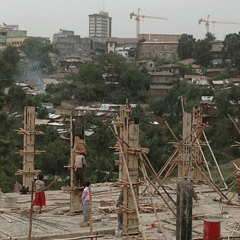- Who We Are
- How We Work
- Regional / Country Initiatives
- Legacy
- Core Themes
- Working Groups
- Portfolio & Results
- Newsroom
- Resources
Expanding Ethiopian Cities Network Fosters Peer-to-Peer Learning
Having seen city networks benefit their counterparts in other countries, a group of Ethiopian urban leaders approached the Cities Alliance about establishing a similar network.
Download Expanding Ethiopian Cities Network Fosters Peer-to-Peer Learning
Although Ethiopia is one of the least urbanised countries in sub-Saharan Africa, it also has one of the continent’s highest urbanisation rates, with cities of all sizes expanding rapidly. This is linked to the country’s impressive economic growth – its gross domestic product grew 10.6 percent annually between 2004 and 2011.
But rapid urbanisation has also led to a host of social and economic problems, including greater income disparity, deepening poverty, rising unemployment, severe housing shortages, and poorly developed physical and social infrastructure. Some 80 percent of Ethiopia’s urban residents live in under-served areas, and two-thirds of the housing is inadequate.
Recognising the enormous role cities can play as engines of growth and development, Ethiopia’s government has decentralised many functions in order to bolster cities’ autonomy and effectiveness. It has also launched comprehensive poverty alleviation and urban development programmes. But city administrators have lacked the experience and capacity to fulfill all of their newly assigned tasks, thus compromising the implementation of these initiatives.
Having seen city networks benefit their counterparts in other countries, a group of Ethiopian urban leaders approached the Cities Alliance about establishing a similar network. With the support of Deutsche Gesellschaft für Internationale Zusammenarbeit (GIZ) and the World Bank, the Ethiopian Cities Association (ECA) was launched to provide a platform for knowledge exchange among city administrators and improve slum upgrading and city plan implementations.
Strengthening Existing Cooperation
Nearly two dozen Ethiopian cities had already been working together informally; the new network intensified and institutionalised this cooperation. Twenty-one cities became charter members; the other founding partners were the Ministry of Works and Urban Development (MWUD), five regional Bureaus of Works and Urban Development, GIZ, the German development bank KfW, and the World Bank.
The ECA was officially launched in 2009. It now represents 28 cities, accounting for most of Ethiopia’s major and secondary urban centres. It is overseen by a board of directors (elected by the mayors of partner cities) and managed by a secretariat.
Aside from knowledge sharing, it has focused on providing technical assistance and establishing cooperative relationships with other international networks.
It also organises an annual “Ethiopian Cities Week,” whose events were attended by more than 120 cities in 2102. In addition to serving as a platform for cities to learn from one other, it also helps educate urban residents and other stakeholders about their roles in urban development.
The agendas have included exhibitions, best-practices competitions (with dozens of entries), youth photo competitions, and forums on topics such as how lakeside cities can balance economic growth with environmental preservation, and how to implement and institutionalise lessons learned from the Urban Local Government Development Programme (ULGDP), a major World Bank-financed capacity-building and infrastructure development programme in which many ECA member cities are participating.
Four workshops – about waste management, revenue enhancement, land management, and lessons from South Africa – were conducted separately, on topics chosen by the cities. These learning exchanges featured cities of different sizes showcasing approaches deemed to represent best practices.
The ECA has also organised an experience-exchange forum between emerging cities and those that have already established modern and functional administration systems, to help speed up the reforms in the first group. Additionally, the group has established partnerships and institutional dialogues with civil society organisations operating in member cities. Its web site (www.ethiocities.com), presented in English and Amharic, contains city profiles, policy and technical documents, and best practices.
Lessons Learned
The ECA benefitted greatly from the informal cooperation that was already taking place among certain cities; building on such a base has been an effective way to ensure a more sustainable network. The commitment and contribution of member cities has also been vital: Ethiopian cities drove the establishment of the ECA and continue to have strong ownership of it.
The new network has alleviated some of the burden on national and regional governments by enabling cities to implement reforms faster and more effectively. The ECA’s documentation and knowledge exchange activities are also helping the country overcome challenges posed by high staff turnover.
To be self-sustaining, the ECA needs strong management. So the Cities Alliance and its partners worked with the organisation to introduce key procedures and develop a strategic plan (in consultation with the ECA’s members and other key urban development stakeholders).

The Ethiopian Cities Association is helping cities drive development more effectively by learning from each other.
Project: Establishment of the Ethiopian Cities Association, and Strengthening and Supporting its Operations.
Partners: Deutsche Gesellschaft für Internationale Zusammenarbeit (GIZ), World Bank, Ethiopia’s Ministry of Works and Urban Development
Duration: 2008 – 2011
Cities Alliance Financing: USD 128,000
Key Results:
-- Institutionalised peer-to-peer learning
-- Created a knowledge bank
-- Improved the planning, urban management, and infrastructure development capacity of Ethiopian cities
“Horizontal experience exchange speeds up national reforms in a way traditional top-down approaches could not achieve." - Tsigereda Tafesse, GIZ

